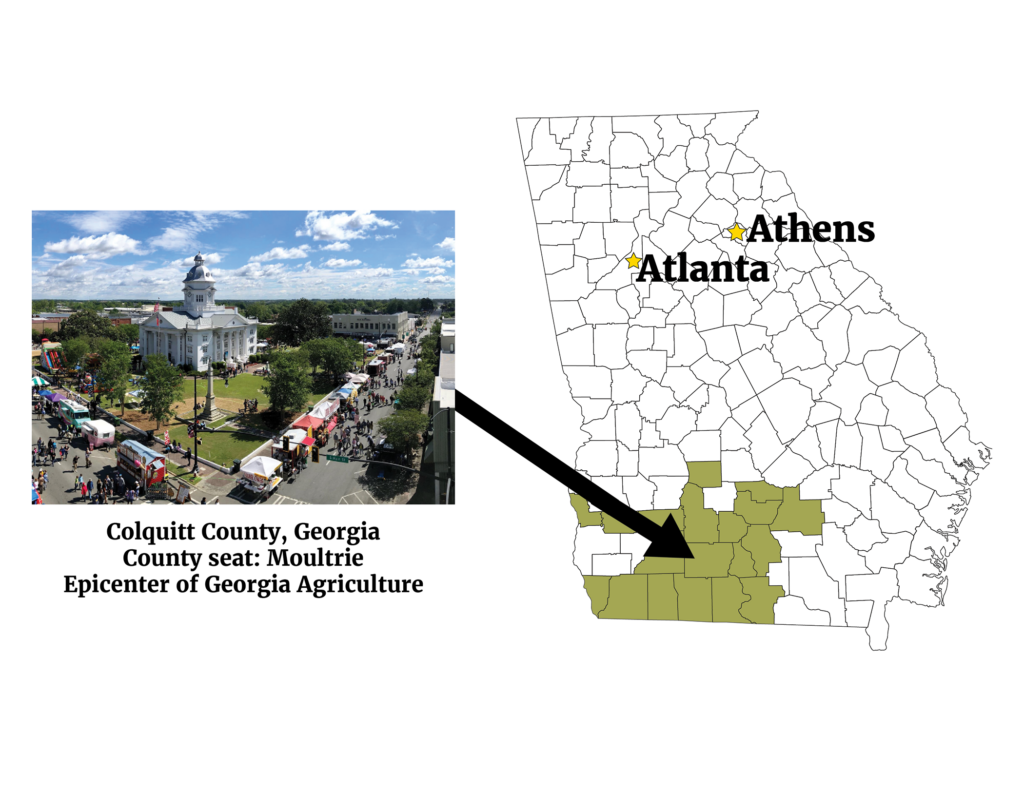The University of Georgia has been awarded $1 million from the National Science Foundation’s Regional Innovation Engines program for the Next Generation Agriculture project, a broad collaboration intended to help Georgia farmers move toward “Ag 4.0”—the fourth agricultural revolution—in their practices.
Next Generation Agriculture, or NextGA, will leverage the strengths of more than 30 public and private organizations to work with farmers in a 20-county region of south Georgia to build an infrastructure for integrative agricultural innovation “in place.” Some 650,000 residents call the area home, and NextGA is intended to empower them with the support and expertise needed to build farming systems that are environmentally, economically, socially and intergenerationally sustainable.
“Specialty crop farmers in Georgia face some unique challenges, such as rapidly changing technology, shortages of labor and other resources, mental health stressors and a sense of isolation, among others,” said Karen Burg, UGA vice president for research and principal investigator for NextGA. “We want to deploy a truly holistic approach, involving cutting-edge research, intentional workforce development and deep community engagement, to partner with these communities to catalyze local entrepreneurialism and build innovation ecosystems that create new opportunities.”
UGA and Fort Valley State University—Georgia’s two land-grant institutions—are NextGA’s academic leads. Two not-for-profit organizations, VentureWell and the Center on Rural Innovation, are also part of the leadership team. Behind those four entities stands a coalition of about 30 public agencies, companies, nonprofits and local governments. Among them is the United States Department of Agriculture’s (USDA) Agricultural Research Service.
“In our mission to deliver scientific solutions to national and global agricultural challenges, we look forward to working with the universities and their regional stakeholders to develop strategies that promote innovative agricultural research in Georgia,” said Archie Tucker, Southeast area director for the USDA Agricultural Research Service.
UGA Extension is a key partner in the project. Each of Georgia’s 159 counties is served by at least one Extension agent. Those individuals, some of whom have worked for years in local communities and have earned those communities’ trust, will be the vital connections between NextGA’s partners and the people they hope to serve.
“Colquitt County and our surrounding counties are consistently rated as the top producing agricultural counties in the state of Georgia. We are looking forward to partnering with NextGA to drive economic development and improve prosperity for the citizens of rural south Georgia so that we can continue to remain in that position,” said Chas Cannon, county administrator for Colquitt County. “Agriculture is the No. 1 industry in the state of Georgia. Our partnership with NextGA will help us continue to build upon our past achievements and keep the rural, agriculture-based economy in south Georgia front and center.
“I’d like to thank the University of Georgia and UGA Extension for their assistance in competing for this award. It is a great opportunity for our region and for Georgia agriculture.”
NextGA is among more than 40 unique teams to receive one of the first-ever NSF Engines Development Awards, which aim to help partners collaborate to create economic, societal and technological opportunities for their regions. NSF Engines is a transformational investment for the nation, ensuring the U.S. remains in the vanguard of competitiveness for decades to come.
“These NSF Engines Development Awards lay the foundation for emerging hubs of innovation and potential future NSF Engines,” said NSF Director Sethuraman Panchanathan. “These awardees are part of the fabric of NSF’s vision to create opportunities everywhere and enable innovation anywhere. They will build robust regional partnerships rooted in scientific and technological innovation in every part of our nation.
“Through these planning awards, NSF is seeding the future for in-place innovation in communities and to grow their regional economies through research and partnerships. This will unleash ideas, talent, pathways and resources to create vibrant innovation ecosystems all across our nation.”
NSF Engines Development awardees span a broad range of states and regions, reaching geographic areas that have not fully benefited from the technology boom of the past decades. These awards will help organizations create connections and develop their local innovation ecosystems within two years to prepare strong proposals for becoming future NSF Engines, which will each have the opportunity to receive up to $160 million.
Launched by NSF’s new Directorate for Technology, Innovation and Partnerships and authorized by the CHIPS and Science Act of 2022, he NSF Engines program uniquely harnesses the nation’s science and technology research and development enterprise and regional-level resources. NSF Engines aspire to catalyze robust partnerships to positively impact regional economies, accelerate technology development, address societal challenges, advance national competitiveness and create local, high-wage jobs.
NextGA is funded as “NSF Engines Development Award: Advancing Next Generation Agriculture in Southern Georgia,” Grant No. 2303322. View a map of the NSF Engines Development Awards.
The full list of NextGA partners includes:
- University of Georgia,
- Fort Valley State University,
- Center on Rural Innovation,
- VentureWell,
- American Association for the Advancement of Science,
- AGCO Corporation,
- Breedr, Inc.,
- Colquitt County Board of Commissioners,
- Colquitt Regional Medical Center,
- Council on Competitiveness,
- Cox Automotive Mobility,
- Dalan Animal Health,
- Enko Chem, Inc.,
- Farmwave, Inc.,
- Georgia Farm Bureau Federation,
- Georgia Dept. of Behavioral Health and Developmental Disabilities,
- Georgia Intellectual Property Alliance,
- Lemelson‐MIT Program,
- Local Bounti,
- Locate South Georgia,
- Moultrie Colquitt County Development Authority,
- National Academy of Inventors,
- Philadelphia College of Osteopathic Medicine South Georgia,
- Rural Innovation Strategies, Inc.,
- SCORE South Georgia,
- SK Battery America,
- Smithsonian Environmental Research Center,
- Southern Regional Technical College,
- Sunbelt Agricultural Exposition,
- Technical College System of Georgia,
- Trimble, Inc.,
- USDA Agricultural Research Service,
- United States Intellectual Property Alliance, and
- Valley, a Valmont company.


